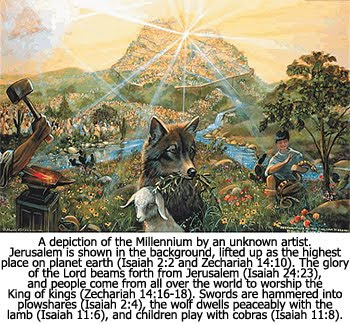Hosea talks about how God will use the Millennium to fulfill all the promises He has made to the Jewish people (Hosea 1:10-11, 2:14-20, and 14:4-7).
He confirms that God will establish peace in the animal kingdom and peace between the nations (Hosea 2:18). And he makes it clear that God’s blessings will also be poured out on the Gentiles (Hosea 2:23).
Hosea’s most fascinating prophecy has to do with the timing of the Lord’s return. He indicates that it will be “two days” after His ascension into Heaven (Hosea 5:15 – 6:2). The context of the passage indicates that the two days represent 2,000 years. Hosea says that after the two days, the Messiah “will raise us up” (the resurrection) that “we may live before Him” for “the third day” (the 1,000 years of the Millennium).
Joel’s end time prophecies focus mainly on “the day of the Lord” which, in his context, is the day of the Messiah’s Second Coming (Joel 1:15, 2:1,13 and 3:14). But he does give us a glimpse of the Millennium when he states that when the Messiah returns, He will dwell “in Zion, My holy mountain” and that Jerusalem will be characterized by holiness (Joel 3:17,21). He also confirms that the land will be revitalized for great agricultural production: “The mountains will drip with sweet wine, and the hills will flow with milk, and all the brooks of Judah will flow with water” (Joel 3:18). He also affirms that Egypt will be a desolation (Joel 3:19).
Amos presents a picture of the Messiah returning as a roaring lion (Amos 1:2). The only thing he has to say about the Millennium is that it will be characterized by agricultural abundance (Amos 9:14) — so much so that “the plowman will overtake the reaper” (Amos 9:13).
Obadiah’s only significant comment about the Millennium is his statement that it will be characterized by holiness (Obadiah 17).
Jonah has nothing to say about the Millennium.
Micah begins his prophecy with a vision of the Second Coming (Micah 1:3-4). Regarding the Millennium, Micah presents a glorious vision of it and does so in words that are almost identical with Isaiah’s (Micah 4:1-7 and Isaiah 2:2-4). He emphasizes the peace and prosperity that will characterize the Millennium (Micah 4:3-4). He also underlines the promise of God that He will make the Jewish people the primary nation of the world during the Millennium (Micah 4:6-7).
Nahum echoes Joel by focusing his prophecies on “the day of the Lord” (Nahum 1:1-8). The only thing he has to say with regard to the Millennium is that the Jewish people will enjoy perfect peace (Nahum 1:15) and the splendor of their nation will be restored (Nahum 2:2).
Habakkuk begins his book by assuring the reader that God will be faithful to send the Messiah back “at the appointed time” (Habakkuk 2:3). He follows that by presenting a very dramatic vision of the Second Coming (Habakkuk 3:3-13). He does not have anything to say about the Millennium.
Zephaniah begins his book by presenting a powerful and frightening vision about the Second Coming (Zephaniah 1:14-18). He concludes his book with a brief prophecy about the Millennium (Zephaniah 3:14-20). He reveals that the Lord will regather all believing Jews back to the land of Israel and that He will live in their midst (Zephaniah 3:17-20). And he promises that God will make the Jewish nation the prime nation of the world (Zephaniah 3:20).
Haggai asserts that at the time of the Second Coming, God will shake the heavens and earth (Haggai 2:6-7), overthrowing all Gentile kingdoms (Haggai 2:22). The wealth of the nations will be transferred to Jerusalem, and the Temple will be rebuilt in glory (Haggai 2:7). And then, using Zerubbabel, the governor of Judah, as a prophetic type of the Messiah, Haggai says that God will give him His “signet ring” — meaning that he will become the King of kings and Lord of lords (Haggai 2:23).
Zechariah says that the Lord “will return to Jerusalem” and will rebuild the Temple (Zechariah 1:16). He calls upon the Jewish people to “sing for joy and be glad” because the Lord has told him that “I am coming and I will dwell in your midst” (Zechariah 2:10).
Concerning the nature of the Lord’s reign, Zechariah says He will be “a priest on His throne,” confirming that the government will be a theocracy (Zechariah 6:12-13). The city of Jerusalem will be called “The City of Truth” and “The Holy Mountain” (Zechariah 8:3). Believing Jews will be regathered from all over the world (Zechariah 9:14-17), and the population of Jerusalem will live in peace and prosperity (Zechariah 8:8,12). The Jewish people will be so greatly blessed that when a Jew walks by, ten Gentiles will grab his robe and say, “Let us go with you, for we have heard that God is with you” (Zechariah 8:23).
Zechariah further states that during the Millennium, all the nations of the world will be required to send delegations to Jerusalem to celebrate the Feast of Tabernacles (Zechariah 14:16). Those nations that fail to do so will receive no rain (Zechariah 14:17-18).
Zechariah concludes his book by emphasizing the holiness that will abound during the Millennium. He says that the bells on the horses’ bridles will be engraved with the words, “Holy to the Lord” (Zechariah 14:20-21).
Malachi contains several passages about the Second Coming, but the only thing it says about the Millennium is that the name of the Lord “will be great among the nations” (Malachi 1:11).
Other Old Testament Prophecies
There are scattered references among the history books of the Old Testament concerning both the Second Coming and the Millennium, and the Psalms are full of them, but I do not have the space to list them in detail. You can find such a listing in my book, The Christ in Prophecy Study Guide. Suffice it to say that I believe I have presented more than enough evidence to prove that the Old Testament is full of prophecies about the end times and the Millennium.
In the last part of this series on the Millennium in the Old Testament, we’ll quickly cover what new information Revelation reveals concerning the Millennial Kingdom.








Several years ago I ran across the work of a Canadian poet named Ethelwyn Wetherald who lived in the early part of the 20th century. While doing some research on her writings, I found a little-known poem she wrote about what it’s like to be a prodigal on the way back home but with your heart not yet changed.
In just a few sentences “Prodigal Yet” captures the plight of the straying child who isn’t quite ready to give up the high life in the “far country”:
Prodigal Yet
Muck of the sty, reek of the trough,
Blackened my brow where all might see,
Yet while I was a great way off
My Father ran with compassion for me.
He put on my hand a ring of gold,
(There’s no escape from a ring, they say)
He put on my neck a chain to hold
My passionate spirit from breaking away.
He put on my feet the shoes that miss
No chance to tread in the narrow path;
He pressed on my lips the burning kiss
That scorches deeper than fires of wrath.
He filled my body with meat and wine,
He flooded my heart with love’s white light;
Yet deep in the mire, with sensual swine,
I long-God help me!-to wallow to-night.
Muck of the sty, reek of the trough,
Blacken my soul where none may see.
Father, I yet am a long way off-
Come quickly, Lord! Have compassion on me!
Ethelwyn Wetherald
I read those words and think about how quickly we can fall, how far we can go, and how easy it is to deceive ourselves and others. Those searing words speak to an inner battle we all feel from time to time, a battle we sometimes sing about in more familiar words:
Prone to wander, Lord, I feel it,
Prone to leave the God I love.
I know that many who read my words have prodigals in your life. You have loved ones who are away from the Lord. Some of them grew up in Sunday School. Some went to a Christian college. Some of them you raised to love Jesus. Some of them once could quote hundreds of Bible verses. Some were leaders in their youth group. Some went on mission trips. Some were preachers. Some were missionaries.
Today they are far from God.
http://www.keepbelieving.com/sermon/2011-06-12-How-God-Pursues-Prodigals-Part-1/?home_feature=1
Dr Reagan,
You have done well in summarising the dispensational understanding of the passages. However, I think and speaking as a fellow dispensationalist you have to show why such passages are to be interpreted according to the literal meaning and not "theologically".
I move around in Reformed-leaning amillennial church circles which all teach some form that the prophecies point to Jesus' First Coming, and by His death on the cross all the theology of glory has already been fulfilled. It was explained that God's Kingdom is one: and Israel was nothing but a type of the real one which is the church. When He ushers in the Kingdom at the Second Coming, it will be just to bring in the New Heaven and New Earth. It is expressed in an exercise of senamtics. There is a lot of theological interpretation such as interpreting Galatians 3:16 to stretch the definition of Israel to mean all believers Jews and Gentiles i.e. the church, Hebrews 1:2 to stretch all references of "the last days" to the period between the First and Second Coming therefore all the end time prophecies lose the literal meanings, and the significance of the definitive article in the term "the Antichrist" in 1 John 2:18 is simply a category description of all who oppose God, not as a future singular world dictator indwelt by Satan. I'm not saying I'm buying them, but most public dispensational Bible teachers are in the deer in the headlight mode when inquiring Christians ask them standard questions after they read New Calvinist teachers such as Horton, Riddlebarger, Goldsworthy, [Kevin] deYoung, etc.
I suggest you need to articulate well to respond to the more recent non-dispensationalist arguments made by people like Kim Riddlebarger who wrote "A Casr for Amillennialism", and in particular Graeme Goldsworthy who wrote the highly influential "According to Plan".
Rehashing yesterday's arguments is a reason hardly anyone under the age of 40 convert from Reformed Covenant theology to dispensationalism but it is a floodgate in terms of defection from dispensationalism.
I have Riddlebarger’s book and have seen several great reviews of it. Sadly, dispies haven’t written books directly addressing the latest CT amil/postmil offerings but you can find great responses to them in various articles and blogs. The problem is they don’t get much media coverage. Riddlebarger’s approach to Scripture fascinates me. On the one hand he criticizes dispies for the gap between the 69th and 70th week of Daniel yet he thinks the last half of the 70th week encompasses the entire church age. Throw in the so-called symbolic resurrection of Rev 20:4; the Rev 20 recapitulation theory which he thinks devastates premil (he’s wrong); the allegorization of Isaiah 65 and Jer 31 (and any other inconvenient verses; the very long chain with which Satan is allegedly imprisoned (yet not) in the symbolic abyss…and you know that these guys aren’t going to be convinced by plain Scripture. They simply deny any literal to passages that don’t fit their theology and you won’t change their minds. Part of their strategy is to point out areas where dispies allegedly aren’t literal. The only motive for that is so they can justify their own rubbery hermeneutics. Incidentally, I think the current trend towards progressive dispensationalism is simply because it allows some people wiggle room in their hermeneutics.
amc
I'm the anonymous poster from above amc. Thanks for pointing this out. Although Riddlebarger hasn't solved the question. All evangelical scholarship agree that 483 years of the 70×7 week in Daniel is the period elapsed between Darius's edict to Jesus's crucifiction reagrdless of their eschatology. Amillennialists fail to explain why if there is no gap post AD 29-33, then why it cannot be 7 years following AD36-40 and must be stretched as eitehr to AD70 (preterist form of amillennialism) or symbolic last 7 for the "last days = Church Age" (idealist from of amillennialism)
BTW, I'm a great fan of Paul Henebury who is from the academic side of dispensationalist: he believes the current malice is because dispensationalists have swallow line, hook, and sinker of American pragmatism in the approach for ministry work. And also we haven't written any good works after 1958. The reason? "Why bother? Christ is probably returning within 5 years".
I'm reposting important portions of Henebury's post some time ago, and it's a sobering read. I understand many won't like what Henebury says but it's important we read it:
http://drreluctant.wordpress.com/2009/12/19/some-mud-that-sticks-a-little-insider-criticism-of-the-face-of-dispensationalism/
Some Mud That Sticks: A Little Insider Criticism of the Face of Dispensationalism
It is well to note that the following charges against dispensationalism are not theological and exegetical in nature, but are more psychological and sociological.
…
Hey anony, I love Paul’s work and have been reading there for quite some time! More people should spend time on his blog reading his posts. I have begun to understand why he calls himself a Reluctant Dispensationalist and prefers the term Biblical Covenantalist. I really appreciated his response to the 95 Theses Against Dispensationalism and the material he presents along with Tony Garland, Andy Woods etc at Spirit and Truth.
amc
One more thing. Other than Paul's reason behind the malice against dispensationalism – I also believe one cannot go past replacement theology. I believe it's the idea that the church isn't spiritual Israel that is the primary motivator behind polemics against disp.
amc
Yep! Malicious Replacement Theology and their allegorical interp.
And Dispy's who are inconsistent with their literal interp straying into allegory when it suits is friendly fire Dispy's can well do without!
Thanks both for the heads up on Spirit and Truth.
Hi amc, I'm the anonymour poster from post 2 again. Glad to hear that Henebury has fans around here, because his camp (plus Tony Garland, Andy Woods, etc) is well known for being personae non grata among the mainstream or popular dispensationalists. Chiefly is because they also read Reformed theology, and discuss a lot of other stuff in additional to eschatology, plus they are not Pentecostal.
Agree that replacement theology is probably the chief cause of the anomsity from the amillennialists. I have a gut feeling that many on the Reformed side may harbour anti-semitic or at least anti-Zionist sentiments. I admire Dr reagan's work on eschatology where he shoots straight in 20 words that takes Henebury about 20 times more word to talk about the same thing. Although I must say that theologically, with no disrespect towards Dr Reagan and nathan Jones and Co, but most of the materials provided on this blog is pretty lightweight. YI often get a feeling that when I read D.A. Carson or Michael Horton they go a lot deeper into the stuff being discussed, and I have a feeling that, for example, Dr Reagan's unique brand of conditional security (once you apostasised you are on the fast track to hell – no other serious Bible teacher has taught it and not supported whatsoever by serious Bible exegesis) stems from a serious deficiency in engaging in theology from a systematic point of view, which is what Henebury has written. We as dispensationalists must acknowledge they have tried to glorify God through their teachings, even though Carson is post-trib (but he is no replacement theologian) and Horton is thoroughly amillennial. Are we, as Henebury repeatedly pleaded, be able to study and expound theology and not just resort to "only Bible prophecies while leaving other dirty works to non-dispensationalists"?
Dr Robert Dean is agin pentecostalism but as a Premil Israel backin Disp, he gets into 'dirty' stuff and shoots from the hip and takes no prisoners, tho he is gentlemanly.Hes a master at Hebrew and Greek and expounds from sunrise to sundown, so he knows his stuff inside out. If I want 'deep' thats where I paddle in awe.
I agree, anony. Paul has spent a lot of time dialoging with CT and Reformed Theology. If I remember correctly, he attended at least one CT seminary back in England so he knows how they think. He would take more words to respond because he has to be precise in his interactions with non-dispies, who can be quite clever in their argumentations. I've had to add a few more books to my library courtesy of Dr Henebury's recommendations.
amc
Gods Word, folks. Not mere men's musings, twisting, distorting. Dr. Reagan presents Gods Word.
satan bound for a thousand years, the Prophets' clear visions of the thousand years, the stated scripture of Revelation, etc. satan will not be loosed into the new heaven and new earth. He will never see them. Remember, he MUST be loosed for a little season. The last rebellion is clearly at the close of the one-thousand year reign of Christ.
http://www.bibleprophecyblog.com/2012/06/can-tribulation-saints-lose-their.html
Can Tribulation Saints Lose Their Salvation?
Andy Garland
(Answer from Scripture is ‘NO’).
Yeah, I remember reading an article written by a non-pretribber who claimed that pretrib was a dangerous doctrine that didn't prepare people for the possibility of taking the Mark of the Beast. The irony? He was a 5 Pointer.
amc
amc and Robert, here's the anonymous poster from post 2 again. Funny enough I did know a guy who is amillennial Reformed and is active on several Reformed Bible teachers' blogs include Pyronamics and Mike Ratliff. He claimed that Phil Johnson's explanation about Christians and suffering disproves the pre-trib rapture. Of course the amillennials keep their ears shut when we try to talk to them about the Great Tribulation period and the different nature from the general trials and sufferings for Christians.
And I agree Paul Henebury is probably the best dispensational authority on what the CT camp is currently reading and producing, and the way to respknd to them. As good as Arnold Fruchtenbaum is, I'm feeling he hasn't really been keeping up to date with theological argument put forth by people like Riddlebarger or Graeme Goldsworthy or even John Piper. He is very respectful to them even as he politely points out they are flat out wrong. Did you find his articles on the Rules of Affinity useful?
Robert, it is not that simple. Oh yes, I have actually found a number of them are very godly and warn about false teachings in the church, like Michael Horton mentioned above, and Chris Rosenberg, Daniel Chew, etc, who have stood firm in face of apostasy in the church even though they are amillennial/postmillennial in eschatology. I can't say the same about David Jeremiah or to some extent Joel Rosenberg who dialogue and even promote seeker driven teachers even though they are dispensationalists!
To give you a taste Robert, how would you define "Gods Word" you used in your post to be read. Does the Bible have an overarching narrative, and so, what narratives? What is the unifying theme of God's plan for history? I can tell you, we dispensationalists fail miserably on this area. And as for your "The last rebellion is clearly at the close of the one-thousand year reign of Christ.", how would you understand last rebelliopn, a snapshot of last rebellion or a symbolism of the world's opposition to Christ's rule? Why is the literal rule superior? This is the type of skepticism you are facing from CT.
Personally, I think Dr Frucht’s Israelology still stands tall against objections thrown at disp by the RT folk. I used it recently to good effect. He’s busy with Ariel ministries and looking after his wife. I doubt he can afford (or wants) to trade tit for tat with polemicists, and there are many of them. Even Paul H has found that these guys are not only prolific but stubborn. His dialog with Steve Hays was, for me, an example of how someone (Hays) can be wrong yet hang onto it so eloquently.
I used to read Ratliff’s blog some 6 years ago before I knew what amil was. I remember one post where he was preaching that Satan was currently locked in the abyss. He was challenged on that but didn’t take too kindly to it. Yet he had no convincing response other than insisting he was right.
amc
Yep and I read all 1000 of them..I love this website!
Yep I'm finding it hard to read Ratliff's article, he was spot on on the need to refocus that the gospel is not to make our life full ( it's a side benefit btw) but rather save us from sin. But he also dismisses dispensationalism and the interpretation of prophecy. When I discovered Fred Butler and Paul Henebury, I haven't quite visited his blog regularly anymore esp as he is post-trib, even though he settled on premillennial later on, and his interpretation of TULIP is lots of theological back reading into the Bible. I challenged him with some of Henebury's counterpoints such as some of his heroes of faith espouse theistic evolution (Machen) he couldn't draw a clear line that Machen was wrong.
Ah, Dave MacPherson! Is that the same guy who took edited out a few random words from Margaret Macdonald’s posttrib vision and presented them as new data that supposedly proved she was pretribulational? Speaking of dishonesty – that would, indeed, be lying and gossip mongering in my book.
amc
Thanks, amc. You might enjoy Googling "Pretrib Rapture's Missing Lines" and "Margaret Macdonald's Rapture Chart."
Correction: I should have mentioned that it would probably be easier to see the above two rapture articles by going to Yahoo instead of Google. Sorry.
Thought you might like this, Irv. You don't have to Google or Yahoo it:
http://mac-eschatology.blogspot.com/2011/12/pretrib-rapture-dishonesty.html